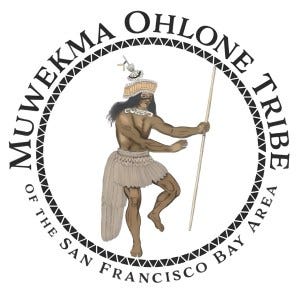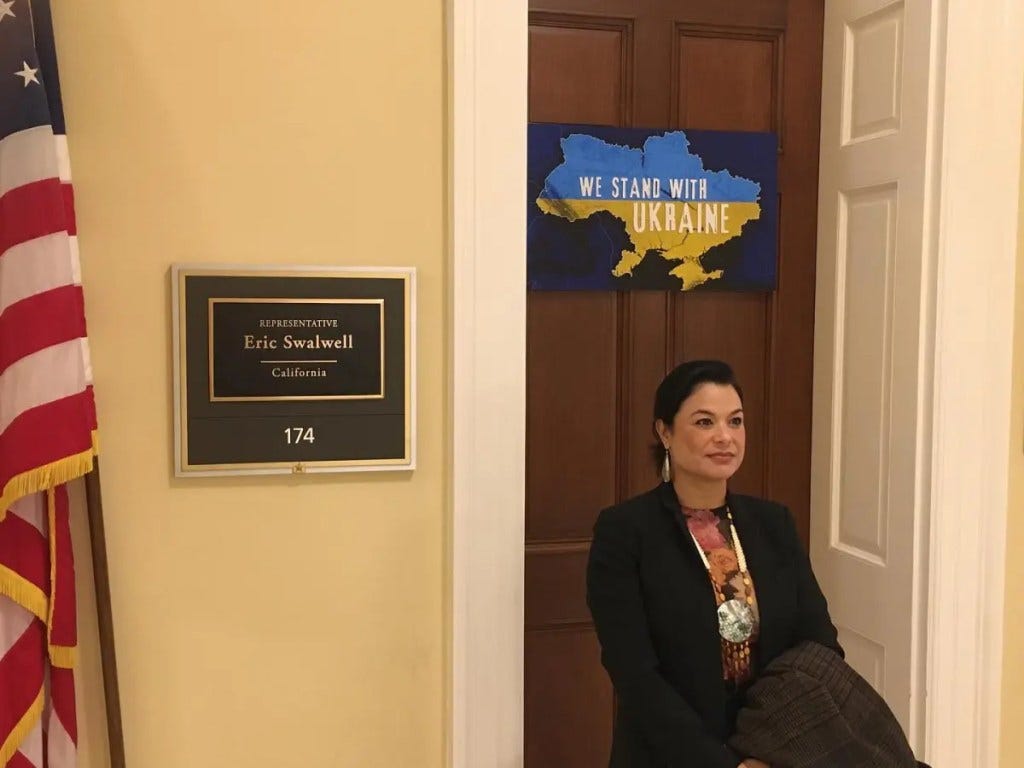Progressives Rally Against CA Rep. Zoe Lofgren: Indigenous Rights Stance Sparks Outrage Among Activists
Tribal Chairwoman Battles Congresswoman for Muwekma Ohlone Recognition

NOTE: Renowned Investigative Journalist Frank Parlato is conducting a deep-dive on California Bay Area Congresswoman Zoe Lofgren. Check out the Frank Report for the latest. This article is adapted from an earlier article by Parlato entitled “Pay to Play Politics? Congresswoman Lofgren’s Alleged Strong-Arm Tactics on Muwekma Ohlone Tribe”
By Dick LaFontaine
California Muwekma Ohlone Tribal Chairwoman Charlene Conception Nijmeh toured Congress last January. She met with House members on both sides of the aisle, seeking to correct a mistake that the Bureau of Indian Affairs (BIA) made 45 years ago.
In 1978, the BIA first drafted a list of federally recognized Indian Tribes. It wrongly excluded the Muwekma Ohlone. Historically, the U.S. Congress recognized the Tribe as part of the Verona Band of Alameda County.
The BIA list recognizes approximately 575 Tribal entities in the lower United States. But to date, the Muwekma Ohlone have been inexplicably excluded.
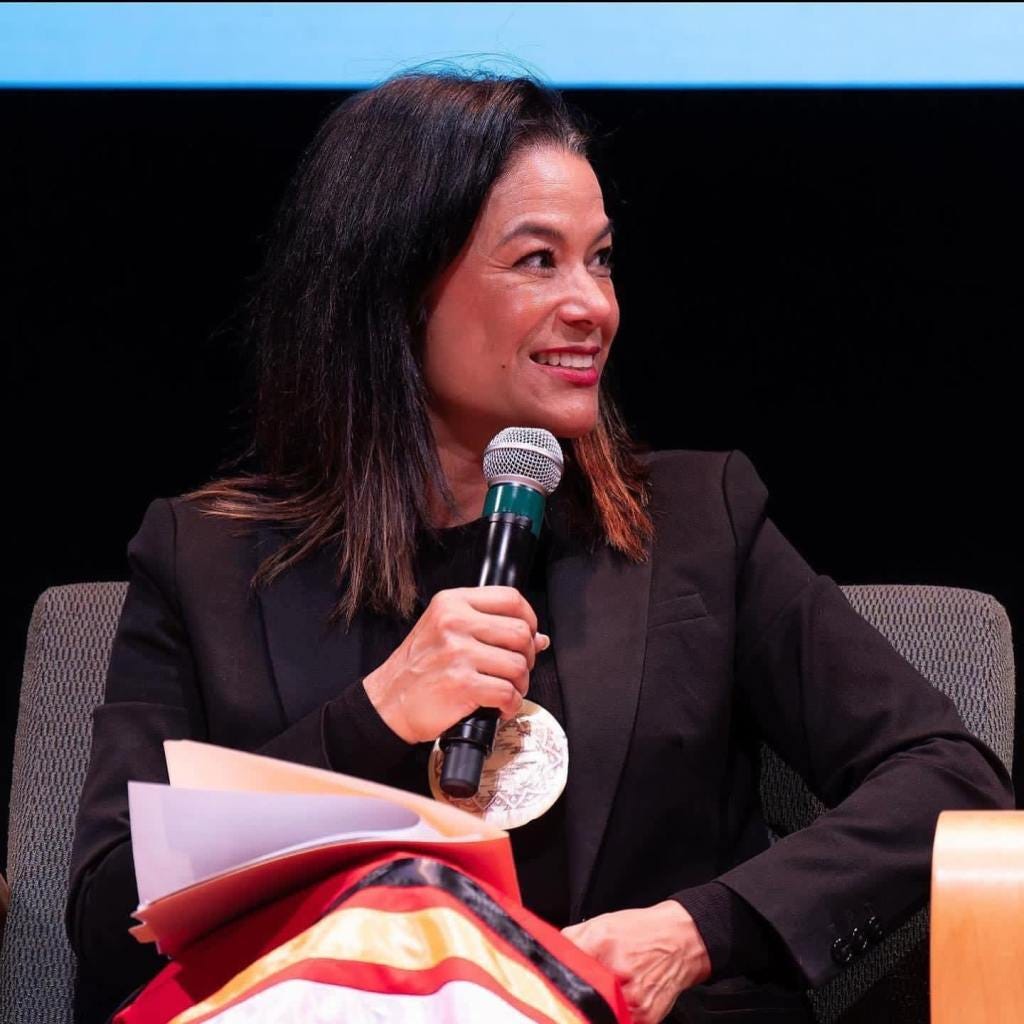
Chairwoman Charlene Nijmeh is trying to change things for her Tribe and her community. She's ready to become a Congresswoman herself to do just that. But she facing steep political opposition from unlikely sources.
Nijmeh charges that Congresswoman Zoe Lofgren tried to “strong-arm” the Ohlone, demanding unconscionable concessions so that her members, many elderly and children, could receive BIA benefits like healthcare, education, and free tuition at California state colleges.
This article explains the back story.
The Muwekma Ohlone Seek Federal Reaffirmation of Tribal Status
Tribal sovereignties are eligible for funding and services due to their status as Indian Tribes.
The Muwekma Ohlone Tribe, a key part of the larger Ohlone people, historically inhabited the San Francisco Bay Area. They are the indigenous peoples, having occupied the area for over 10,000 years.
The Ohlone, also known as the Costanoan (from Spanish costeño meaning 'coast dweller'), comprised around 50 distinct tribes, each with its own language and cultural practices. These tribes, which never self-identified as a single group, were collectively labeled under the Ohlone name during Spanish colonization.
Spanish colonization in the late 18th century drastically altered their way of life. Forced conversions and labor under the mission system, notably at Mission San Francisco De Asis, led to a significant loss of cultural identity. The tribe faced devastating impacts from diseases, warfare, and ongoing colonization.
Despite these challenges, the Muwekma Ohlone Tribe, historically recognized by the U.S. Congress as part of the Verona Band of Alameda County, continued to persist.
Today, the Muwekma Ohlone people continue their efforts to preserve their heritage in the Bay Area, focusing on educational initiatives, language revitalization, and the practice of cultural storytelling to keep their rich history alive.
A Trip to Capitol Hill
Chairwoman Charlene Nijmeh came to Washington armed with a presentation and solid evidence about the Muwekma Ohlone Tribe. She had all the answers as to why they should qualify for federal BIA recognition.
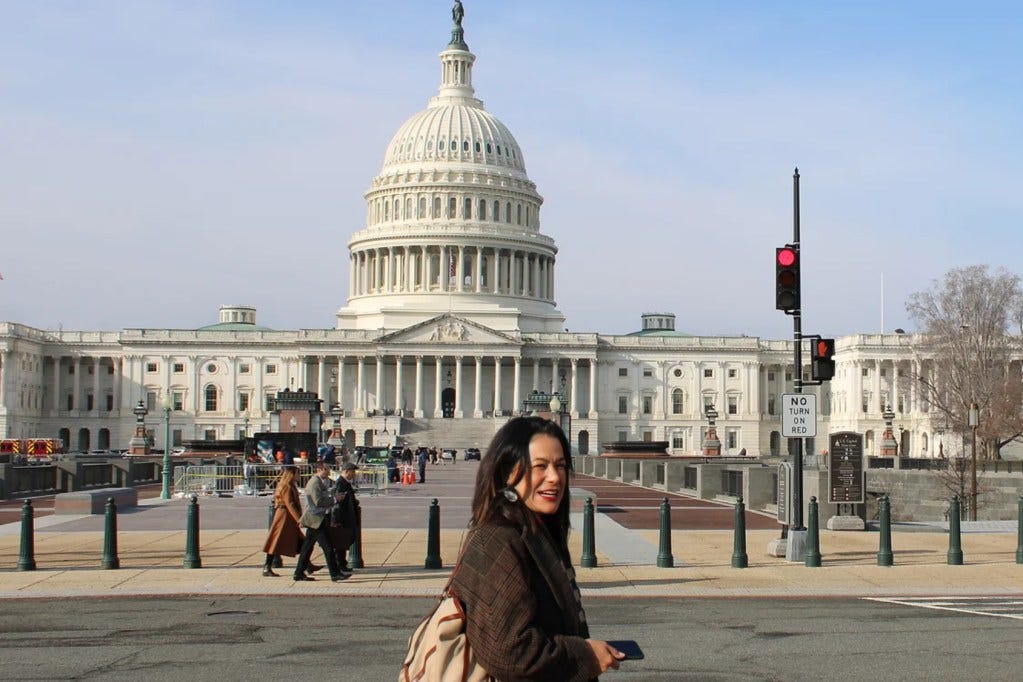
Since 1970, Congress has recognized or reaffirmed 26 tribes – including tribes that were terminated and denied recognition by the acknowledgment process. Under any standard, Chairwoman Charlene Nijmeh's and the Tribe's facts are indisputable:
DNA studies confirm that the Muwekma Ohlone people have lived in the Bay Area for thousands of years.
Congress federally recognized the Muwekma Ohlone Tribe in the early 20th Century.
Only Congress, under Article I, Section 8 of the US Constitution, has the power "to regulate commerce with the Indian Tribes."
Congress never terminated the Muwekma Ohlone Tribe's relationship with the U.S. Government - this is a reaffirmation.
100% of today's Muwekma Ohlone are directly descended from the Verona Band of Alameda County Congress previously recognized.
A genetic comparison study published by Stanford and Illinois researchers supports the Tribe's assertion. The findings show genomic evidence of an ancient Muwekma Ohlone connection to the now Silicon Valley area. Modern members of Chairwoman Nijmeh's people have a direct genetic connection to ancient peoples buried east of San Francisco Bay.
Family histories, government records, and records from the Bay Area Spanish missions further back the scientific findings. The Muwekma Ohlone's ancestors have lived in this area of California much longer than many archaeologists estimated.
Muwekma Ohlone Tribe Asks CA Democratic Congressional Reps For Federal Recognition
Federal recognition means a tribe has a government-to-government relationship with the United States. It can make and enforce laws and impose taxes. Recognition also confers certain benefits from the Bureau of Indian Affairs. The Tribe's members can also receive care from the Indian Health Service.
In California, Native Americans who are members of tribes on the BIA-recognized list enjoy a panoply of additional benefits. These include free tuition at colleges in the University of California System. UC's Native American Opportunity Plan ensures that in-state systemwide Tuition and Student Services Fees are fully covered for undergraduate and graduate students.
One would think Chairwoman Nijmeh would have had an easy lift. San Francisco Bay Area Congressional Representatives Ro Khanna, Jimmy Panetta, Eric Swalwell, Anna Eshoo, and California state congressional Chair Zoe Lofgren are all left-of-center Democrats.
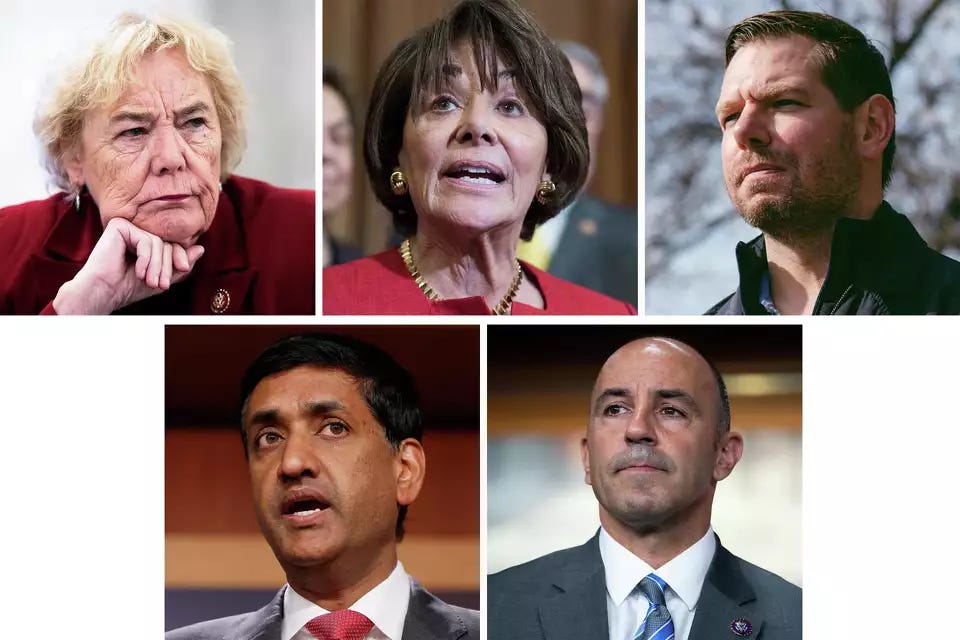
After all, the platform of the Democratic National Committee purports to honor indigenous Tribal Nations:
Democrats recognize and support the sovereignty of Tribal Nations and pledge to work on a nation-to-nation basis to empower Indigenous peoples, increase economic development in Tribal Nations, and protect Tribal lands, assets, resources, and treaty rights. We honor and support the great Indigenous traditions all across the country...
Democrats believe the federal government must commit to providing full funding to fulfill unmet trust and treaty obligations to Tribal Nations and Native American peoples. We will work on a nation-to-nation basis to increase funding, resources, and financial tools for Tribes, particularly in the key areas of criminal justice, health care, education, housing, and economic development.
It should have been a "slam dunk" for this group of lawmakers. Right?
But after centuries of colonialism, exploitation, and genocide, the California Bay Area Congressional Delegation from the Bay Area still wanted the Muwekma Ohlone tribe to "Pay to Play." Or at least their leader, Congresswoman Zoe Lofgren, did.
Did the Silicon Valley Congressional Delegation Try to “Strong-Arm” the Muwekma Ohlone?
In a meeting on January 10 of last year at Rep. Anna Eshoo's Capitol Hill office, five Congress members allegedly attempted to coerce Muwekma Ohlone Tribal Chairwoman Charlene Nijmeh. Those present included Rep. Ro Khanna, Rep. Jimmy Panetta, Rep. Eric Swalwell, Rep. Anna Eshoo, and Rep. Zoe Lofgren, all Democrats.
Chairwoman Charlene Nijmeh's meeting with the Bay Area Congressional delegation sparked concern, outrage, and disappointment. Initially, Rep. Eshoo offered to carry legislation for the Tribe. In November 2022, Eshoo's office communicated she would sign on to federal recognition legislation as its primary sponsor. Days later, Rep. Swalwell and Rep.Khanna joined her as co-sponsors.
At the meeting, Eshoo, Swalwell, and Khanna did a complete 180. The politicians were more concerned with political attacks on Rep. Zoe Lofgren by Standford, UC Berkeley students, and Native American-owned media publications than they were with committing to support the Muwekma Ohlone Tribe.
Zoe Lofgren is Chair of the California Democratic Congressional Delegation. She was explicitly criticized for her perceived colonialist and elitist attitudes by progressive activists.
Chairwoman Nijmeh Recorded the Meeting
There is a recording of the meeting. Eshoo, Swalwell, and Khanna all distance themselves from their earlier commitments to help the Muwekma Ohlone Tribe.
The delegation aimed at indigenous activist and consultant Matt Ricchiazzi. He accused the Congressional Representatives, particularly Zoe Lofgren, of trying to pressure Nijmeh into unconscionable concessions like ceding tribal land and avoiding the gambling industry in exchange for federal recognition.
Ricchiazzi criticized the Representatives' behavior as corrupt and likened it to Soviet-era tactics.

He also condemned Rep. Khanna for purportedly racist remarks. Khanna insisted that the Muwekma Ohlone Tribe doesn't understand colonialism as well as he does. Khanna is among the wealthiest members of Congress based on his Congressional Disclosure Statement.
California Congressional Delegation Chair Zoe Lofgren Holds Out On the Muwekma Ohlone Tribe
Initially, three of the five members of the Bay Area delegation agreed in principle to help the Muwekma Ohlone Tribe achieve federal recognition with no questions asked.
However, the Dean of the delegation, Rep. Zoe Lofgren, apparently saw a chance to feather her nest. She held out for "concessions." The other Democrats fell in line. As a result, Rep. Lofgren, a lawyer and Stanford graduate, was explicitly criticized for her cultural insensitivity and perceived colonialist and elitist attitudes.
What was motivating this entrenched establishment Democrat?
![California Democratic Party Congressional Representatives Nancy Pelosi [l] and Zoe Lofgren [r]. California Democratic Party Congressional Representatives Nancy Pelosi [l] and Zoe Lofgren [r].](https://substackcdn.com/image/fetch/$s_!ezCb!,w_1456,c_limit,f_auto,q_auto:good,fl_progressive:steep/https%3A%2F%2Fsubstack-post-media.s3.amazonaws.com%2Fpublic%2Fimages%2F5eedba4a-6bf9-4c19-b9f9-587b6a70a32c_1024x768.jpeg)
After Nancy Pelosi, her solid political ally, Zoe Lofgren, is arguably the most powerful Californian in Congress. She chairs the 46-member California Democratic Congressional Delegation. Lofgren represents Silicon Valley and counts on Big Tech to fill her campaign coffers. She has no shortage of money or influence.
In 2002, Lofgren was pro-Muwekma Ohlone Tribe. She even addressed the issue of their federal recognition on the floor of Congress. At that time, it wasn't about recognition but "reaffirmation of their tribal status by the federal government."
"To do anything else is to deny this tribe justice. They have waited patiently and should not have to wait any longer," said a younger Zoe Lofgren two decades ago.
In the twenty years since her remarks on the House floor, Zoe Lofgren appears to have forgotten about the Muwekma Ohlone Tribe’s claim of indigenous rights. What has changed to make this what appears to be a crass political “shake-down”?
Over a year after Chairwoman Charlene Nijmeh's visit to Capitol Hil, the Tribe is no closer to federal recognition than it has been at any time since 1978. Given the Democratic Party's stated commitment to "recognize and support the sovereignty of Tribal Nations," how is the Muwekma Ohlone Tribe no further now than it was during the Jimmy Carter Administration?
Tough Questions For California Congressional Delegation Chair Zoe Lofgren
We have questions for Silicon Valley Representative Zoe Lofgren:
Why doesn't Rep. Lofgren still strongly support the Muwekma Ohlone Tribe as she did in 2002?
Why doesn't she support the DNC platform that purports to defend the sovereignty of Tribal Nations?
Did members of Lofgren's California delegation backtrack on support for the Muwekma Ohlone Tribe at her direction?
What has changed with Zoe Lofgren's views? Is she now under the influence of other forces in Silicon Valley? If so, who are they?
Is Zoe Lofgren insensitive to essential issues of equity and fundamental fairness crucial for Native American and progressive voters?
How about corruption? Is this a pure instance of "Pay to Play"? Which Lofgren interests stand to benefit if the prohibition on gaming, the ceding of tribal lands, and other proposed concessions materialize?
Or is this use of a public office for political purposes? Does Zoe Lofgren actually see Chairwoman Charlene Nijmeh as a political threat? Is Lofgren's posture merely creating leverage to exchange Muwekma Ohlone Tribal recognition for Nijmeh's departure from the Congressional race?
And importantly, are Congresswoman Zoe Lofgren's actions a violation of the law or Congressional Ethics? Has she placed her Attorney license at risk?
When you want answers, you go straight to the top. We called Rep. Lofgren's San Jose office for comment.
They directed us to Ally Kehoe, Rep. Lofgren's Communications Director since 2019.
We sent this email:
Ally,
I spoke to the Congresswoman's District Office in San Jose, and they directed me to you for press comment.
I am an investigative journalist helping to research an interest article on Native American affairs. I was wondering about Congresswoman Lofgren's position on the Muwekma Ohlone Tribe.
The Congresswoman has familiarity with the Tribe from her days on Board of County Supervisors. She was there when anthropologists tried to dig up sacred burial grounds without the Tribe’s permission.
In 2002, Lofgren proudly demanded justice for the Muwekma Ohlone people on the floor of the House of Representatives:
“I proudly support the long struggle of the Muwekma Ohlone Tribe as they continue to seek justice and to finally, and without further delay, achieve their goal of their reaffirmation of their tribal status by the federal government. This process has dragged on long enough. I hope that the Bureau of Indian Affairs and the Department of Interior will do the right thing and act positively to grant the Muwekma Ohlone tribe their rights as a Federally Recognized Indian Tribe. … To do anything else is to deny this tribe justice. They have waited patiently and should not have to wait any longer.”
But recently, Congresswoman Lofgren has not supported the Muwekma Ohlone's claims with the Bureau of Indian Affairs (BIA), who have excluded the Tribe from the list of federally recognized tribes.
Does the Congresswoman agree that Congress and the federal government have previously recognized the Muwekma Ohlone Tribe, prior to 1978?
As the Congresswoman knows, the BIA recognizes approximately 575 Tribal entities in the lower United States. Roughly one fifth are located within the State of California. These sovereignties are eligible for funding and services due to their status as Indian Tribes.
The Muwekma Ohlone have a robust, established, and documented history. Their qualifications and documentation are on par with or exceeds some of the current federally recognized tribes, including those from the State of California. Does the Congresswoman have any specific issues with the Muwekma Ohlone's qualifications and documentation for BIA recognition?
Does the Congresswoman believe the Bureau of Indian Affairs made a mistake in 1978 when it excluded the Muwekma Ohlone from the list of federally recognized tribes?
Did the Congresswoman believe the BIA was mistaken in 2002 when she made her comments on the House floor?
Does the Congresswoman still believe the BIA is mistaken? If not, why not?
News reports says that in January that Rep. Ro Khanna, Rep. Jimmy Panetta, Rep. Eric Swalwell, and the Congresswoman went to Rep. Anna Eshoo's office on the Hill and had a closed door meeting with Muwekma Ohlone Tribal Chairwoman Charlene Nijmeh on the Tribe's issues with BIA list inclusion and recognition. Can the Congresswoman confirm that meeting occurred? Can she confirm the attendees?
There are allegations that at the meeting, Tribal Chairwoman Nijmeh was the recipient of an attempted "strong-arm." The claim is that Tribal Recognition with the BIA would be "Pay to Play" and require concessions including that the Tribe cede sovereign lands and covenant not engage in the casino/gambling trade. Does the Congresswoman have any response?
There are additional allegations that the Congresswoman is insensitive to latent and systemic racism, colonialism, and the history of genocide faced by indigenous peoples. Does the Congresswoman have any response?
Does the Congresswoman support BIA recognition of the Muwekma Ohlone Tribe?
Is there any other information or context we should be aware of in our reporting?
Thank you in advance for your time.
Regards,
Dick LaFontaine
Several Weeks, No Response
We allowed several weeks for Representative Lofgren's office to respond to our inquiries. It’s been crickets. The public deserves an answer from the Congresswoman about whether she has legitimate reasons to deny the Ohlone their indigenous rights or whether all of this is just plain politics.
To follow this story, please see the Frank Report’s coverage.



